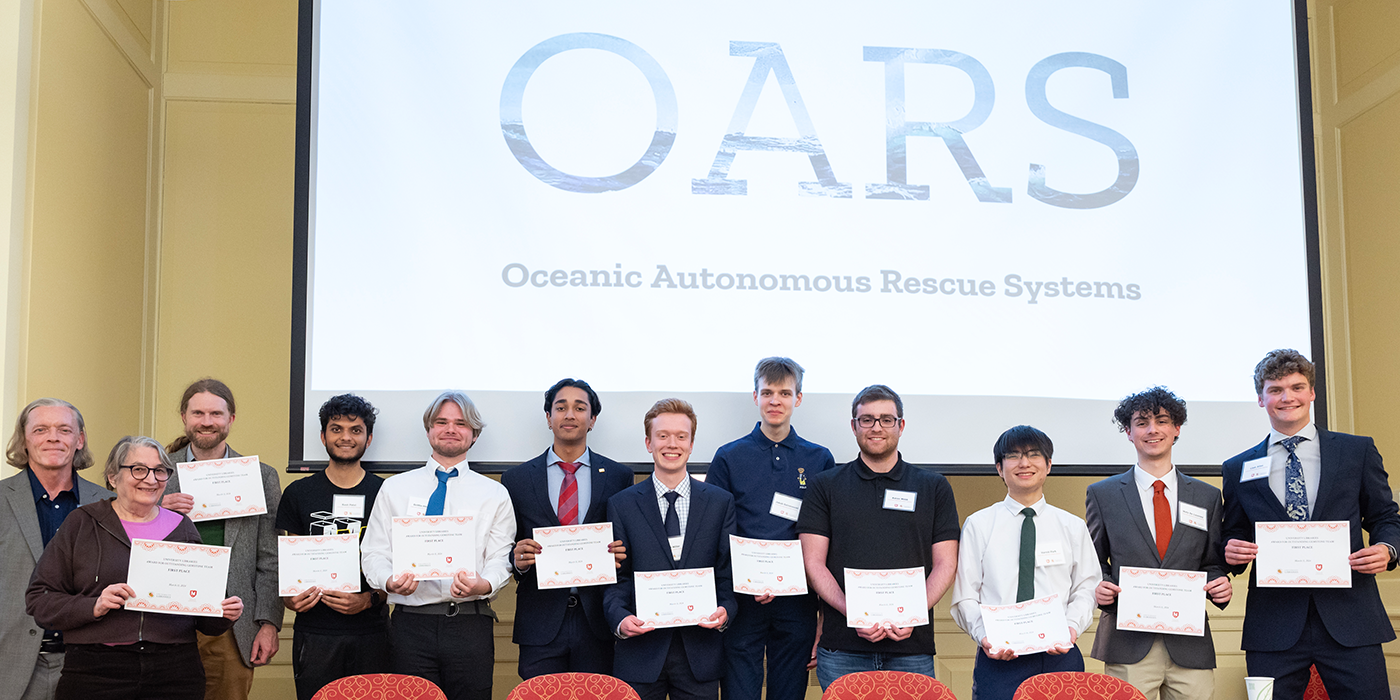Student Research Team Studying Unmanned Maritime Search and Rescue Operations wins UMD Libraries’ 2024 Gemstone Research Award
Student research teams presented their research to a panel of faculty judges on Monday in McKeldin Library.

On Monday, Team OARS edged out Team VIRAL and TOXINS to clinch the UMD Libraries’ Gemstone Research Award at the finalists presentations, where each team presented their research to a panel of judges. UMD Libraries awarded a first place prize of $2,000 and a $1,000 prize to both runners up. The Gemstone Research Award recognizes student teams that demonstrate excellence in the integration of principles of information literacy into their work and who conduct research with integrity and diligence.
UMD’s Gemstone Honors Program is a multidisciplinary four-year research program for undergraduate Honors students of all majors. Under the guidance of faculty mentors from across campus and a subject specialist librarian, teams of students design, direct, conduct and often publish original research in a variety of fields. Teams submit their research and three finalists are chosen to present their project to a panel of judges composed of Libraries’ faculty. Libraries’ partnership with Gemstone has been in place since the start of the Gemstone Honors Program over 25 years ago.
Meet the Teams
First Place: Team OARS
Members: Liam Allen, Neil Deng, Jakub Gelvanoski, Griffin Hevesy, Vijay Jetton, Akshith Kantareddy, Mats De Lausnay, Patrick Miller, Harold Park, Kush Patel, Aditya Prashanth, Aaron Webb.
Faculty Mentor: Dr. Michael Otte, PhD
Librarian Mentor: Nevenka Zdravkovska
Within contemporary maritime search and rescue operations, both the response time
and safety of manned rescue missions is suboptimal in poor ocean conditions. Team OARS
aims to optimize the efficiency of marine rescue applications by employing unmanned surface
vessels (USVs), an innovative vision system, and swarm theory. This approach is designed
to achieve two pivotal objectives: to minimize wasted time and resources involved in current
search and rescue operations, and to reduce the risk to rescue personnel. In dangerous
weather conditions, advanced unmanned vessels can be promptly deployed to search for and
locate survivors, only requiring rescuers to be exposed to adverse conditions to evacuate the
survivor. In the future, we plan to construct a fully functioning USV and use computer
simulations to prove the feasibility of our proposal.
Runner-Up: Team TOXINS
Members: Cameron White, Eesha Reddy, Graham Ferguson, Hannah LaPadula, Johannes John, Kenna Costello, Madeline Semler, Margaret Kato, Megan Chen, Nivetha Rajapandi, Sofia Orezzoli, and Tami Mumuney
Faculty Mentor: Dr. Yanjin Zhang
Team Librarian: Matthew Cain
Current treatments for human immunodeficiency virus (HIV) involve antiretroviral
therapies (ARTs) such as nucleoside reverse transcriptase inhibitors. Although effective for viral
inhibition, these drugs may cause adverse side effects from high mitochondrial toxicity and a
consequential increase in reactive oxygen species (ROS). To mitigate the side effects, we
propose to explore antioxidant supplementation derived naturally from antioxidant-rich plants,
focusing on the herb Thymus vulgaris. This study will quantify ROS and cell death as an
indicator of oxidative stress in ART-treated cells to determine the antioxidant’s ability to reduce
adverse effects from HIV treatment. Conclusions from this study could then be applied in various
clinical settings to reduce adverse effects of similar diseases and drug treatments.
Runner-Up: Team VIRAL
Members: Ademide Adeyemo, Arnav Patel, Ashley Pocasangre, Aubrey Alexander, Caroline Hobson, Clara Abdelmalek, Erin Li, Haider Hussain, Hannah Rasmussen, Janet Ruan, Nandi Patel, Renee Jaranson, Soumya Maturi, and Zofia Dyba
Faculty Mentor: Dr. Youssef Kousa; Dr. Erin Tran
Team Librarian: Nedelina Tchangalova
Prenatal viral infections can cause adverse outcomes, ranging from neurodevelopmental abnormalities to fetal demise. For congenital Zika syndrome, caused by prenatal Zika infection, there is no treatment or standard of care. Data suggest potential in using immunoglobulin-based therapies and vaccines. However, these treatments might only offer protection for a specific viral strain, and often require several doses, making them less cost-efficient. Small-molecule drugs, an option less explored, might allow for a more efficient mechanistic method of viral clearance. We propose testing lysosomal activators and inhibitors. We suggest farnesyltransferase inhibitors, a class of cancer drugs, as lysosomal activators to increase viral clearance and protect the developing brain from injury. Ultimately, investigating many therapeutic options will allow for rapid development of treatment.